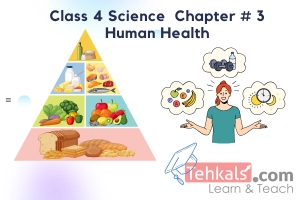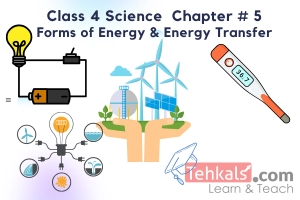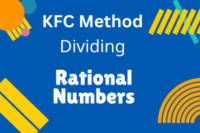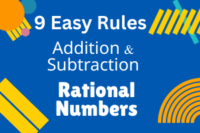Class 4 Science MCQs Chapter 4
Published: 2 Oct 2022
Welcome to tehkals.com, your go-to destination for Class 4 Science MCQs Chapter 4. Explore our comprehensive collection of Class 4 Science MCQs of Chapter No. 2, focusing on “Matter and its Characteristics.”
If you want to succeed and clear your PST, CT, DM, PT, CT, TT, SST, and SS Tests, then our comprehensive MCQs (Multiple Choice Questions) provide the perfect solution by giving the treasure of knowledge and bank of MCQs.
Class 4 Science MCQs Chapter 4
Matter and its Characteristics
Chapter No. 4 Test # 1
1. Anything which occupies space and possesses mass is called________.(a) Energy
(b) Matter
(c) Both a & b
(d) None of these
Show Answer
Matter
2. Generally, matter occurs in _______states.
(a) Two
(b) Three
(c) Six
(d) Seven
Show Answer
Three
3. Few things neither become smaller on pressing nor are their volume changes, such things called ________.
(a) Solids
(b) Liquids
(c) Gases
(d) None
Show Answer
Solids
4. Characteristics of solids
(a) Definite shapes
(b) Definite volume
(c) No definite shape
(d) Both a & b
Show Answer
Both a & b
5. Water _______ its shape.
(a) Changes
(b) Does not change
(c) Definite
(d) None of these
Show Answer
Changes
6. _______ gets the shape of that vessel in which it is poured.
(a) Solids
(b) Liquids
(c) Gases
(d) None of these
Show Answer
Liquids
7. Characteristics of liquids
(a) Definite shapes
(b) Definite volume
(c) No definite shape
(d) Both b& c
Show Answer
Both b& c
8. Air is the combination of various _______
(a)
(b) Liquids
(c) Gases
(d) None of these
Show Answer
Gases
9. Gases are ________ to us.
(a) Visible
(b) Not visible
(c) Bad
(d) Good
Show Answer
Not visible
10. Mostly we can feel the fragrance or odour of ________
(a) Solids
(b) Liquids
(c) Gases
(d) None of these
Show Answer
Gases
11. Fragrance of flower is the example of ________
(a) Solids
(b) Liquids
(c) Gases
(d) None of these
Show Answer
Gases
12. ________ have neither a fixed shape nor a definite volume.
(a) Solids
(b) Liquids
(c) Gases
(d) None of these
Show Answer
Gases
13. The inflated balloon burst when placed in the sunshine due to ________
(a) Increase in K. E
(b) Decrease in K.E
(c) Both a & b
(d) None of these
Show Answer
Increase in K. E
14. Quantity of matter in a body is called its_________.
(a) Mass
(b) Energy
(c) Both a & b
(d) None of these
Show Answer
Mass
15. The mass of matter remains _________.
(a) Variable
(b) Constant
(c) Low
(d) High
Show Answer
Constant
16. The S.I unit of mass is _______.
(a) Gram
(b) Milligram
(c) Kilogram
(d) None of these
Show Answer
Kilogram
17. 1 kilogram=________
(a) 100 grams
(b) 1000 grams
(c) 10 grams
(d) 1 gram
Show Answer
1000 grams
18. Space that an object occupies is called its ________.
(a) Mass
(b) Energy
(c) Gas
(d) Volume
Show Answer
Volume
19. In solids, the particles are ________ attached with each other.
(a) Weakly
(b) Strongly
(c) Partially
(d) No
Show Answer
Strongly
20. In solids, the particles have ________ force of attraction
(a) Weak
(b) Strong
(c) No force
(d) Minus
Show Answer
Strong
21. The particles of _______ vibrate to and fro motion about their mean position.
(a) Solids
(b) Liquids
(c) Gases
(d) None of these
Show Answer
Solids
22. Solids ________ be easily pressed.
(a) Can
(b) Cannot
(c) Never
(d) None of these
Show Answer
Cannot
23. ________ maintain their definite shape and volume.
(a) Solids
(b) Liquids
(c) Gases
(d) None of these
Show Answer
Solids
24. The particles of ________ are near each other.
(a) Solids
(b) Liquids
(c) Gases
(d) None of these
Show Answer
Liquids
25. The force of attraction in liquids are ________ than in solids.
(a) Stronger
(b) Weaker
(c) Higher
(d) None of these
Show Answer
Weaker
26. In ________ particles can move near or far from one another.
(a) Solids
(b) Liquids
(c) Gases
(d) None of these
Show Answer
Liquids
27. When particles can move near or far from one another and thus ______ can flow.
(a) Solids
(b) Liquids
(c) Gases
(d) None of these
Show Answer
Liquids
28. The particles in a ________ are much farther apart from one another.
(a) Solids
(b) Liquids
(c) Gases
(d) None of these
Show Answer
Gases
29. The particles in a gas move fast because of ________ force of attraction.
(a) Stronger
(b) Weaker
(c) Higher
(d) None of these
Show Answer
Weaker
30. The ________ particles can move freely in all directions.
(a) Solids
(b) Liquids
(c) Gases
(d) None of these
Show Answer
Gases
31. ________ occupy all the available space.
(a) Solids
(b) Liquids
(c) Gases
(d) None of these
Show Answer
Gases
Chapter No. 4 Test # 2
32. The objects that allow heat to pass are called ________.(a) Conductors
(b) Insulators
(c) Non – conductor
(d) None of these
Show Answer
Conductors
33. _______ are conductors.
(a) Iron
(b) Copper
(c) Both a & b
(d) None of these
Show Answer
Both a & b
34. The objects that do not allow heat to pass are called _______.
(a) Conductors
(b) Insulators
(c) Semi-conductor
(d) Both b & c
Show Answer
Insulators
35. ________ are insulators.
(a) Wood
(b) Rubber
(c) Both a & b
(d) None of these
Show Answer
Both a & b
36. The _______ is usually solids.
(a) Metal
(b) Non metals
(c) Mixture
(d) None of these
Show Answer
Metal
37. All the metals are _______.
(a) Rough
(b) Shiny
(c) No color
(d) Yellow color
Show Answer
Shiny
38. ________ is/are the example of hard and strong metals.
(a) Iron
(b) Copper
(c) Both a & b
(d) Silver
Show Answer
Iron
39. ________ is/are the example of soft metals.
(a) Iron
(b) Copper
(c) Both a & b
(d) Steel
Show Answer
Copper
40 Wires and foil sheets are made from _______ metals.
(a) Soft
(b) Hard
(c) Iron
(d) None of these
Show Answer
Soft
41. ________ foil is used in beautification of sweets.
(a) Silver
(b) Iron
(c) Aluminum
(d) All of these
Show Answer
Silver
42. ________ foil is used to cover cooked food and other things.
(a) Silver
(b) Iron
(c) Aluminum
(d) All of these
Show Answer
Aluminum
43. Metals occur in _______.
(a) One color
(b) Various colors
(c) Yellow color
(d) Dark color
Show Answer
Various colors
44. ________ is reddish.
(a) Copper
(b) Silver
(c) Light pink
(d) Light blue
Show Answer
Copper
45. ________ is white.
(a) Copper
(b) Silver
(c) Light pink
(d) Light blue
Show Answer
Silver
46. Tin and Nickle are _______ in color.
(a) Copper
(b) Silver
(c) Light pink
(d) Light blue
Show Answer
Light pink
47. Zinc, Chromium and Aluminum are ________ in color.
(a) Copper
(b) Silver
(c) Light pink
(d) Light blue
Show Answer
Light blue
48. Most of the metals are ________ in color.
(a) Grey
(b) Silver
(c) Light pink
(d) Light blue
Show Answer
Grey
Chapter No. 4 Test # 3
49. The floating and sinking of object depends on their _____.(a) Mass
(b) Density
(c) Kinetic energy
(d) Potential energy
Show Answer
Density
50. The objects having less density than the density of water ____on/in water.
(a) Sink
(b) Float
(c) Dive
(d) None of these
Show Answer
Float
51. The object having more density than the density of water ___on/in water.
(a) Sink
(b) Float
(c) Dive
(d) None of these
Show Answer
Sink
52. The mass present in definite volume is called its______.
(a) Mass
(b) Density
(c) Kinetic energy
(d) Potential energy
Show Answer
Density
53. The metals usually have _______ density.
(a) Less
(b) More
(c) Equal
(d) No
Show Answer
More
(a) Mass
(b) Density
(c) Kinetic energy
(d) Potential energy
Show Answer
Density
55. Two objects having equal volume but different mass, then which one has high density.
(a) High mass
(b) Low mass
(c) Equal mass
(d) None of these
Show Answer
High mass
56. On the basis of density, metals are called ________________
(a) Heavy metals
(b) Light metals
(c) Both a & b
(d) None of these
Show Answer
Both a & b
57. Zinc, mercury, chromium are the examples of _______ metals.
(a) Heavy metals
(b) Light metals
(c) Both a & b
(d) None of these
Show Answer
Heavy metals
58. Magnesium, aluminum and titanium are the examples of _______ metals.
(a) Heavy metals
(b) Light metals
(c) Both a & b
(d) None of these
Show Answer
Light metals
59. Some metals have magnetic properties and attracted by a _______.
(a) Heavy metals
(b) Light metals
(c) Magnet
(d) None of these
Show Answer
Magnet
60 Metals that allow electricity are _______ conductors of electricity.
(a) Good
(b) Bad
(c) No
(d) Less
Show Answer
Good
61. Metals that allow heat are _______ conductors of heat.
(a) Good
(b) Bad
(c) No
(d) Less
Show Answer
Good
62. Electric wires can make from which of the following metals.
(a) Copper
(b) Aluminum
(c) Silver
(d) All of these
Show Answer
All of these
63. The metals which are good conductors of electricity are used to make
(a) Furniture
(b) Glass
(c) electric wires
(d) Bulb
Show Answer
electric wires
64. The metals which are ______conductors of heat are used to make cooking utensils.
(a) Good
(b) Bad
(c) No
(d) Zero
Show Answer
Good
65. The_______ are used to make cooking utensils.
(a) Metals
(b) Non metals
(c) Wood
(d) Glass
Show Answer
Metals
66. Matter consists of _______ particles.
(a) Large
(b) Tiny
(c) Both a & b
(d) None of these
Show Answer
Tiny
67. Which one of these has the most volume?
(a) Book
(b) Pencil
(c) Eraser
(d) Cricket bat
Show Answer
Book
68. Which of these groups is the correct example of the three states of matter?
(a) Snow, rain, cloud
(b) Dew, Rain, Water vapors
(c) Snow, Cloud, Steam
(d) Rain, Water vapors, cloud
Show Answer
Snow, rain, cloud
69. Put two spoons made of steel and wood in a cup of hot water. After few minutes the steel spoon become hot whereas, the wooden spoon does not become hot, what does it show?
(a) The steel became hot soon in the presence of wood
(b) Metal is a better conductor of heat than wood
(c)Wood is better conductor of heat than metal
(d) Metal heats the water quickly than wood.
Show Answer
Metal is a better conductor of heat than wood
70. Water, ice and steam all have different temperature. What is the order from coldest to hottest?
(a) Steam, Ice, Water
(b) Ice, Steam, Water
(c) Steam, Water, Ice
(d) Ice, water, steam
Show Answer
Ice, water, steam

- Be Respectful
- Stay Relevant
- Stay Positive
- True Feedback
- Encourage Discussion
- Avoid Spamming
- No Fake News
- Don't Copy-Paste
- No Personal Attacks



- Be Respectful
- Stay Relevant
- Stay Positive
- True Feedback
- Encourage Discussion
- Avoid Spamming
- No Fake News
- Don't Copy-Paste
- No Personal Attacks





